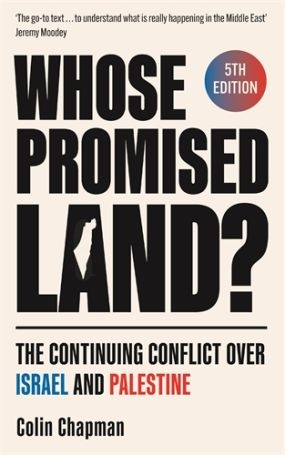Whose Promised Land?
Colin Chapman writes about the background to a revised edition of his book Whose Promised Land? The Continuing Conflict over Israel and Palestine
 A few weeks after the events of October 7, 2023, I was really surprised to be asked by SPCK to produce a revised edition of Whose Promised Land?, which was first published by Lion in1983, and had already been through four revisions.
A few weeks after the events of October 7, 2023, I was really surprised to be asked by SPCK to produce a revised edition of Whose Promised Land?, which was first published by Lion in1983, and had already been through four revisions.
For obvious reasons they wanted to publish it on October 7, 2024.
My own engagement with these issues began when I lived with my family through part of the civil war in Lebanon which began in 1975. As I tried to work out what the conflict was about, my Lebanese friends helped me to understand that it was the presence of thousands of Palestinian refugees in Lebanon which had upset the balance between the Christian and Muslim communities.
This was the starting point for my engagement with the Israeli-Palestinian conflict.
In a small Christian bookshop in West Beirut I came across David Hirst’s book, The Gun and the Olive Branch, which contained a detailed account of the origins and development of the conflict.
In the same shop I found W.E. Davies’ magisterial volume, The Gospel and the Land, which explored the way New Testament writers interpret the meaning of the land in the light of the coming of Christ. From then on I was determined to make sure that there was no conflict between my understanding of history and my interpretation of the Bible.
It was in that context in Lebanon that I wrote the book. Because I was aware that many western readers had a very sketchy understanding of the history of the conflict, the first third of the book focused on the history of the Zionist movement, the establishment of the State of Israel in 1948, and all the significant developments since then.
The second third of the book discussed the theme of the land in the Bible, since, in the words of Walter Brueggmann, the land is ‘a central, if not the central theme of biblical faith.’ What do Old Testament writers say about the land, and how do New Testament writers interpret the Old Testament promise and prophecies about the land?
The last third of the book attempted to bring together the study of the history and biblical interpretation by asking what might be ‘the things that make for peace’?
This latest edition attempts to explain the background to Hamas’s attack and Israel’s war on Hamas and Gaza which followed. Other new chapters address issues that have become increasingly relevant in recent years.
Can criticism of Zionism and Israel be dismissed as being inspired by antisemitism?
What should be the role of international law in resolving the conflict?
And if Israel’s occupation of the West Bank can hardly continue for ever, should we be working for the two-state or the one-state solution?
In writing about these issues since the early 1980s I’ve been painfully aware of the deep divisions among Christians - not only in their understanding of the history, but also in their interpretation of the Bible.
Christian Zionists start with a basic sympathy for Zionism and Israel because they believe that Old Testament promises about the land and prophecies about a return to the land have been fulfilled in the creation of the State of Israel in 1948 and its capture of East Jerusalem in 1967. Some go further and see all these events as ‘signs of the times’ which are pointing to the second coming of Christ. Christian Zionists therefore are likely to be very supportive of Israel, even if they are sometimes critical of its policies.
The alternative to Christian Zionism, which is often described as ‘Covenant Theology,’ starts with the conviction that all the four strands of the covenant promises made to Abraham were pointing forward to the coming of the kingdom of God through the incarnation.
According to this way of interpreting the Bible, the creation of the State of Israel has no profound theological significance. So if the history that has been unfolding before us is not part of a detailed, divine plan that was predicted in the Bible, we need to make judgments about what has happened in the same way that we make judgements about other historical events.
I suspect that in every church in this country there are some (or many?) who could be called Christian Zionists, and some (or many?) who would take a different approach. Perhaps, therefore, there needs to be some ‘hard talk’ in every congregation, if we are to know how to pray intelligently about the conflict and be genuine peacemakers.
If this seemingly intractable conflict is ever going to end, the challenge to Israelis, Palestinians and the watching world – to Jews, Christians, Muslims and people of no faith - is to find a political formula than enables seven million Jews and seven million Palestinians to share the land between the Mediterranean Sea and the River Jordan and live peacefully side by side.
Colin Chapman began his theological studies at London Bible College, and has worked for 18 years in the Middle East, teaching in seminaries in Egypt, Beirut and Bethlehem.
His last job was teaching Islamic Studies at the Near East School of Theology and the Arab Baptist Theological Seminary in Beirut. His books include Christianity on Trial (Lion), Responding to the Challenges of Islam (IVP), and Whose Promised Land? (Lion and SPCK).
Whose Promised Land? The Continuing Conflict over Israel and Palestine - revised and expanded edition (2024), is published by SPCK
Do you have a view? Share your thoughts via our letters' page.
Baptist Times, 03/02/2025